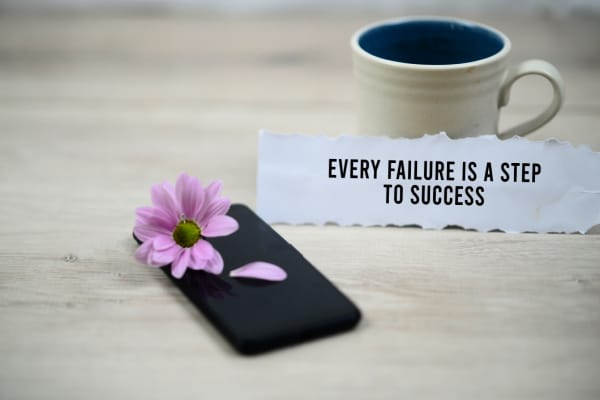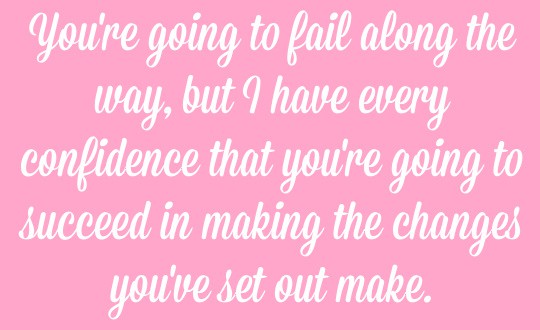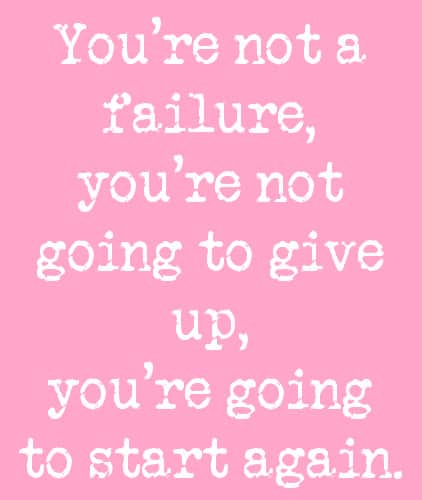
Healthy Life Toolbox, Tool #8 – Expect to Fail
Say what now?
We’ve been talking all month about making healthy, positive changes this year, and I’ve been sharing some practical tools that will help you as you begin to make those changes. I’ve been encouraging you to really go for it this year – to decide what kind of woman you want to be, decide that you are worth it, and then work on becoming that woman.
And now I’m telling you to expect to fail?
Correct.
Of course, I’m not saying that you’re going to fail in your goal of becoming stronger, eating healthier, creating a happy marriage, starting a business, or pursing any other healthy or positive goal. In fact, I have every confidence that you’re going to succeed in making the changes you’ve set out to make.
What I am saying is that you’re going to fail along the way. So expect to fail. More than once. In fact, lots of times. And so am I.

Why? Because change is hard. And positive, meaningful, good-for-you change is often very hard. It requires making a series of changes consistently, over a significant period of time.
Which means that sometimes you’ll fail. You’ll mess up, you’ll get off track, you’ll want to throw in the towel.
You’ll encounter intense resistance that will lead you down the wrong path. In other words, you’ll fail.
But you know what? Failure is normal, it’s expected, and it’s not something to fear (nobody likes it, but you don’t have to fear it). In fact, you should expect to fail.
So what does failure look like when you’re working on making healthy or positive changes in your life? It can take 1,000 different forms, which might include:
- Eating a bunch of food that you really don’t want to eat.
- Watching TV instead of exercising.
- Wasting time on social media instead of working on your blog or your Etsy shop.
- Letting fear stop you from trying something new.
- Falling back into old patterns in your marriage.
- Staying up late when you’ve committed to getting more sleep.
We’ve all done those things, and you know how it makes you feel – mad at yourself, frustrated, even disgusted. In other words, you feel like a failure.
But failing to do something that you really want to do, that you know is healthy and positive for you, doesn’t mean that you’re a failure.
It means you’re normal.
Every woman who has ever achieved anything significant – getting fit, switching to a healthy diet, reaching a healthy weight, establishing healthy boundaries in her life, creating a business, starting a ministry – has failed. More than once. In fact, many times.
The key is that those women didn’t decide that they were “failures.” Instead, they picked themselves up, tried again, tested a new strategy, or even started over.
In fact, that’s the pattern for success in any important endeavor – struggle, fail, start again, persist, do it all over again and again, and – finally – succeed.
And as you go through this pattern, you learn things you never would have learned any other way.
I’ve learned, for example, that I have to exercise as soon as I get home from work – not an hour later, not even 30 minutes later. If I don’t, I’ll fail to stick with my goal of moving my body in ways that make it healthier and stronger almost every day of the week.
If I don’t get any exercise today because I didn’t exercise right after work, I’m not a failure – it just means that I haven’t taken a step that I know is effective. And not taking that step keeps me from reaching a goal that’s important to me. But – and this is the important part – it’s something I can fix.
I’ve also learned that I use social media as a way to entertain myself when I need to work on things that scare or challenge me. If I start scrolling through Facebook or Instagram when I really want to be writing an article or working on an ebook, I’ll probably fail to work on my goal that day – but I won’t be a failure. (Although I might feel like one…)
So l want to encourage you to re-frame failure and put it to work for you. First, treat it as a verb, not a noun. You “failed” on a particular occasion (or, even better, you didn’t yet succeed) but you aren’t a “failure.” You didn’t do something you wanted or planned to do – and it feels like failing, but you’re not a failure.
Second, practice changing the verb. Instead of “failing,” think of it as “learning,” “figuring things out,” or “getting smarter:”
- You learned that not making a meal plan and doing some food prep on the weekend means that you won’t eat healthy that week.
- You figured out that watching TV before you exercise means that you’re not likely to exercise.
- You learned that opening Facebook or Instagram before you’ve worked on an important project means that you won’t work on it that day.
- You got smarter and realized that messing around on your phone or tablet in bed means that you won’t sleep well.
And third, forgive yourself and take the next step toward your goal. Listen, we’ve established that we’re all going to mess up, get off track, and do things that seem an awful lot like failure. Maybe you’re already experiencing it this year. Maybe your healthy eating or exercise plan is already off track. Maybe you haven’t done anything to work on that ministry you plan to start this year. Maybe your writing project consists of two paragraphs – or a blank page. Maybe your plans to connect with your husband at a deeper level have gone nowhere.
That’s fine – you are normal. Give yourself a break. You’re not a failure, you’re not going to give up, you’re going to start again.
In other words, you’re going to expect to fail and learn to work through it, using those three simple steps – treat it as a verb, practice changing the verb, and forgive yourself and take the next step.
Use the Tool – Today or tomorrow, identify something you’re doing that makes you feel like a failure, something related to one of your important goals or plans for the year. Then work through the 3 steps and use them to make your plan for doing things differently – in a way that moves you forward on that goals or plan. And download this picture and save it where you’ll see it when you need a reminder.

I’d love to know what you’re working on this and how this idea works for you. Leave a note in the Comments, or email me at gc @ calmhealthysexy.com
Next, we’ll talk about Tool #9 – Focus on action, not motion.
You can find all of the Healthy Life Toolbox posts here.
Rosalyn says
These tools have been remarkable and because they have been in bite-size amounts of information I have been able to implement and continue to review the info, so that it’s sense making and manageable with my goal setting.
After a question is posed I go back and follow up with my responses and I have a better action plan.
Currently my husband is being prepared for a surgical procedure on his eyes. Because of COVID he has had to quarantine before the surgery. I’m off my exercise plan, but I’m going to forgive myself and prioritize his health and return to my wellness schedule once he’s feeling better.
It’s a legitimate stall, I’m not quitting that’s what the enemy wants me to think.
GC says
Hi Rosalyn – I’m so happy that the tools are practical and do-able for you! That is absolutely my goal, so I really appreciate you letting me know that they’re working for you.
I’m praying that all goes well with your husband’s surgery – and all of the extra “stuff” that COVID adds to having surgery and being in the hospital. I think that you’re wise to give yourself grace to focus on his recovery and not beat yourself up about your exercise program. You can also do whatever kind of physical activity presents itself and is practical during that time (I remember walking the halls in the hospital and walking in the neighborhood around the hospital many times when my Mom was recovering from surgery!)
This is a “small steps, keep going, give yourself grace” approach, and it sounds like that’s exactly what you’re doing!
Gaye